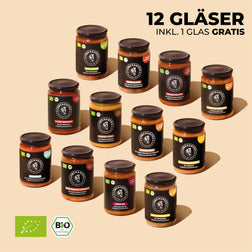Food Fact: Everything you need to know about pumpkin seeds
Pumpkin seeds - a food that rarely ends up in the shopping trolley or even in the garbage after the pumpkin has been hollowed out. The small seeds should not be underestimated: they spice up every dish in terms of taste and they also bring your health and fitness into shape.
In this article you will also find out why you can use pumpkin seeds to lose weight and achieve top performance and how you can optimally integrate pumpkin seeds into your everyday life.
CONTENTS
Why are pumpkin seeds healthy?
Like other seeds and nuts, pumpkin seeds are relatively high in fat and protein while at the same time having a low carbohydrate content. They provide the body with a good amount of fiber for digestion and the immune system, as well as high amounts of vitamins and minerals.

The perfect snack for athletes...
... and everyone who wants to eat a healthy and balanced diet, because: The kernels provide a lot of high-quality protein and essential fatty acids. About a third of the nucleus consists of proteins ; The high content of essential amino acids is particularly noteworthy here, which is twice as high as in walnuts, for example. The content of non-essential amino acids is also considerable. The body needs amino acids for a variety of processes, sometimes for the formation of new cells (and thus muscles) or for the regulation of the hormone balance. If you want to avoid ravenous appetite attacks or are plagued by them due to hormones, pumpkin seeds are a good choice: Not only does a balanced hormone balance keep the blood sugar level constant, but also the dietary fibers and fats they contain. Accordingly, despite their high fat and calorie content, pumpkin seeds can even help you lose weight because they fill you up well and for a long time. Did you know that our delicious organic mountain lentil stew dish also contains pumpkin seeds?
Speaking of amino acids: Pumpkin seeds contain the amino acid tryptophan, from which the body forms serotonin. Consuming pumpkin seeds not only improves mood , but also the quality of sleep : serotonin is the precursor of the sleep hormone melatonin, which is why consuming the small seeds is a healthy TV snack, especially in the evening.
Carbohydrates hardly play a role in pumpkin seeds, which is why they are only partially suitable as a pre-workout snack. The kernels are still suitable for optimal energy supply , as they contain a lot of phosphorus (100g of the kernels cover 75% of the daily requirement). Phosphorus plays an essential role in energy production and storage and is therefore essential for energy supply.
The fatty acid profile of pumpkin seeds
In terms of the fat profile , pumpkin seeds are not the top suppliers when it comes to the highly health-promoting fatty acids. While it's true that pumpkin seeds contain essential fatty acids - those that the body can't produce itself - and these in high amounts; however, the content of saturated fatty acids is also quite high. The problem with the fatty acid profile of pumpkin seeds lies mainly in the ratio between the omega-3 and omega-6 fatty acids. According to the WHO, this should ideally be 1:1, since omega-6 fatty acids are pro-inflammatory and omega-3 fatty acids are anti-inflammatory.
In the diet of the western world, however, the ratio is on average 20:1, which is due to the consumption of the “wrong” high-fat foods, such as animal products/fats or vegetable oils such as sunflower oil.
In short : Even if omega-6 fatty acids are essential for optimal health (they are responsible for blood clotting, growth and repair processes, blood pressure regulation or lowering LDL cholesterol, among other things), it should not be overdone . Pumpkin seeds are not unhealthy for this reason, but they should not be consumed mainly because of the fat - especially in a diet based on many animal products - but because of the amino acids, vitamins, minerals and fiber they contain.
vitamins and minerals
Pumpkin seeds contain a range of vitamins and minerals. Particularly noteworthy are:
Vitamin B1: responsible for energy metabolism, the nervous system and heart health
Vitamin E: contained in every body cell membrane and has an antioxidant effect; protects against inflammation, strengthens the immune system and is just as important for the nerves and the ability to concentrate
Magnesium: Responsible for blood pressure regulation, transmission of stimuli/contractions in the nervous system and muscles, maintaining bone stability and metabolism
Iron: essential for oxygen transport and blood formation
-
Phosphorus: essential for the supply/production and storage of energy and the regulation of the acid-base balance
Zinc: involved in protein, fat and carbohydrate metabolism, regulates hormones, strengthens the immune system, anti-inflammatory, important for wound healing
Manganese: Essential in providing energy and building connective tissue, cartilage and bones, component of enzymes
In summary : Pumpkin seeds protect the heart and brain, strengthen the immune system, ensure good concentration and performance and can prevent inflammation or cancer. For athletes, they are particularly effective in muscle building, energy supply and regeneration, and in general they ensure well-being: Pumpkin seeds support healthy sleep, protect against cravings and keep you full for a long time, stimulate digestion and lift your spirits.
The nutrient profile at a glance
100g pumpkin seeds |
daily requirement |
|
nutritional value |
590 calories |
|
protein |
37g |
|
Fat |
48g |
|
carbohydrates |
14g |
|
fiber |
9g |
30g |
potassium |
570 mg |
4000 mg |
magnesium |
285 mg |
300-350mg |
iron |
5 mg |
12.5 mg |
phosphorus |
516 mg |
700 mg |
zinc |
6400 mcg |
8500mcg |
manganese |
2900 mcg |
3500mcg |
Vitamin B1 |
586 mcg |
1100 mcg |
Vitamin B3 |
1707 mcg |
15000mcg |
vitamin E |
4000mcg |
13000mcg |
Recipe ideas with pumpkin seeds
Pumpkin seeds can be used in many different ways. You can sprinkle them on all dishes - both sweet and savory: from porridge and muesli to soups, stews, salads and pasta to desserts. They can also be added to homemade pastries, eg bread or nut cake, muesli bars or muesli. This not only ensures a crispy consistency, but also visually enhances the dish.
Be sure to try our mountain lentil stew to convince yourself of pumpkin seeds in hearty dishes. You can also use the open jar to prepare pumpkin risotto and sprinkle additional pumpkin seeds on top for more crunch.
Roast the pumpkin seeds yourself
The next time you buy pumpkin, don't throw away the seeds. Remove the pumpkin pulp from them, wash them thoroughly and dry them. Then bake them in the oven at 180°C for 20 minutes. Turn the kernels 1-2 times in between and make sure that they don't get too dark. You can mix them with 1-2 tbsp oil and spices of your choice beforehand; but that is optional.
You can either eat the dried pumpkin seeds raw or sprinkle them on (pumpkin) dishes such as this pumpkin pasta . You need pumpkin for the recipe anyway, so it's definitely worth trying.
This article was written by our author Lisa. Her greatest passions are nutrition/health, cooking and sport.







